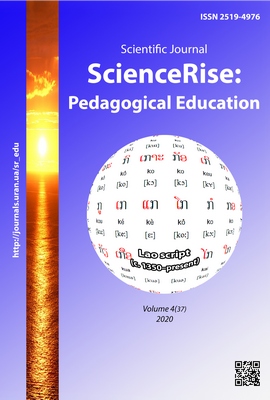The organization of distance learning of music teachers in the conditions of postgraduate education reforming
DOI:
https://doi.org/10.15587/2519-4984.2020.207401Keywords:
distance learning, teachers of musical art, postgraduate education, forms of education, reformAbstract
The article is devoted to highlighting actual problems of organizing distance learning of teachers of music arts during reforming and introduction of the newest forms of professional development of pedagogical workers in the system of postgraduate education. The modern experience in the organization of distance learning of music teachers in postgraduate education is considered. Attention is paid to modern problems of distance learning, experience of organization of a distance learning stage in different types of advanced training courses, introduction of thematic, author's courses for teachers of music art is described. The description of distance training of author's advanced training courses is given, the advantages of in-depth training and thematic training are demonstrated. The description of innovative forms of organization of distance learning of teachers in the system of postgraduate education is given. Features of modern distance learning platforms are considered and their educational opportunities are described. The description of advantages of using modern educational environments, forms of organization of educational activity of teachers during distance learning is given. The list of types of educational tasks, tests, digital materials in the educational environment is presented. The most common forms of teacher training in distance learning are described.
The experience of organisation of distance learning for music teachers in postgraduate education is described. The list of problems of postgraduate pedagogical education of art teachers, which were appeared due to reforming and realization of the new content of art education is presented. The problems and needs of professional improvement of music teachers, which can be solved during the distance learning in the postgraduate education system, are discussed.
The acticle describes the results of research in postgraduate pedagogical education, which demonstrate the priority types and forms of distance learning among music art teachers. The content of distance, network, e-learning of teachers, effective technologies of learning music teachers in postgraduate pedagogical education are highlighted
References
- Liakhotska, L. L. (Ed.) (2017). Orhanizatsiia osvitnoho protsesu v zakladakh pisliadyplomnoi pedahohichnoi osvity z vykorystanniam elektronnykh tekhnolohii navchannia. Kyiv, 198.
- Bykov, V., Leshchenko, M. (2016). Digital humanistic pedagogy of open education summary. Teoriia i praktyka upravlinnia sotsialnymy systemamy, 4, 115–130.
- Bykov, V. Yu. (2017). Knowledge society and Education 4.0. Edukacja dla przyszłości w świetle wyzwań XXI wieku, 1 (1), 30–45. Available at: http://lib.iitta.gov.ua/id/eprint/708567
- Kukharenko, V. M., Berezenska, S. M., Buhaichuk, K. L., Oliinyk, N. Yu., Oliinyk, T. O., Rybalko, O. V. et. al.; Kukharenko, V. M. (Ed.) (2016). Teoriia ta praktyka zmishanoho navchannia. Kharkiv: KhPI, 284.
- Bykov, V. Yu. (2015). Dystantsiine navchannia v krainakh Yevropy ta SShA i perspektyvy dlia Ukrainy. Informatsiine zabezpechennia navchalno-vykhovnoho protsesu: innovatsiini zasoby i tekhnolohii. Kyiv: Atika, 77–140.
- Bazeliuk, O. (2018). Zmist i struktura tsyfrovoi kultury pedahohichnykh pratsivnykiv zakladiv profesiinoi osvity. Profesiina pedahohika, 16, 81–87.
- Bazeliuk, O. V., Spirin, O. M., Petrenko, L. M., Kalenskyi, A. A. et. al. (2018). Tekhnolohii dystantsiinoho profesiinoho navchannia. Zhytomyr: «Polissia», 160.
- Quendler, E., Lamb, M. (2016). Learning as a lifelong process – meeting the challenges of the changing employability landscape: competences, skills and knowledge for sustainable development. International Journal of Continuing Engineering Education and Life-Long Learning, 26 (3), 273–293. doi: http://doi.org/10.1504/ijceell.2016.078447
- Gaspar H. 5 Ways To Boost Conversions With Dynamic Content. Available at: https://blog.kissmetrics.com/boost-conversions-with-dynamic-content/
- Designer and Instructor Tutorials. Exploring WebCT Campus Edition 6.0. Available at: http://etcdata.tctc.edu/VPAA/Instructional_Support/ReadyToDelete/ResourceCenter/r%20center/WebCTCE600_Design_Instruct_ref_2005_07_18.pdf
- Abaldea, M. J., Barba, J., Caba, J., Escolar, S., de la Torre, J. A., Rincon, F., Lopez, J. C. (2019). Aerial-Ground Collaborative Pathfinding with HLSTL using FPGAs. 2019 XXXIV Conference on Design of Circuits and Integrated Systems (DCIS). doi: http://doi.org/10.1109/dcis201949030.2019.8959919
- Kukharenko, V. M. (2015). Systemnyi pidkhid do zmishanoho navchannia. Informatsiini tekhnolohii v osviti, 24, 53–67.
- Bykov, V. Yu. (2001). Project approach and distance learning in professional management training. Krymski pedahohichni chytannia, 30–50.
- Metodychni rekomendatsii do rozroblennia elektronnoho navchalnoho kursu (2015). Kyiv, 36.
- Kartashova, L. A., Bakhmat, N. V., Plish, I. V. (2018). Rozvytok tsyfrovo kompetentnosti pedahoha v informatsiino-osvitnomu seredovyshchi zakladu zahalnoi serednoi osvity. Informatsiini tekhnolohii i zasoby navchannia, 68 (6), 193–195.
- Polozhennia pro dystantsiine navchannia (2004). Nakaz Ministerstva osvity i nauky Ukrainy No. 40. 21.01.2004. Available at: http://zakon4.rada.gov.ua/laws/show/z0703-13#n18
- Kondratova, L. (2019). Distance courses “Methodology of teaching art in primary school based on principles of the New Ukrainian School” as a means of professional self-development of an art teacher. Art and Education, 3, 50–53. doi: http://doi.org/10.32405/2308-8885-2019-3-50-53
Downloads
Published
How to Cite
Issue
Section
License
Copyright (c) 2020 Lyudmila Kondratova

This work is licensed under a Creative Commons Attribution 4.0 International License.
Our journal abides by the Creative Commons CC BY copyright rights and permissions for open access journals.
Authors, who are published in this journal, agree to the following conditions:
1. The authors reserve the right to authorship of the work and pass the first publication right of this work to the journal under the terms of a Creative Commons CC BY, which allows others to freely distribute the published research with the obligatory reference to the authors of the original work and the first publication of the work in this journal.
2. The authors have the right to conclude separate supplement agreements that relate to non-exclusive work distribution in the form in which it has been published by the journal (for example, to upload the work to the online storage of the journal or publish it as part of a monograph), provided that the reference to the first publication of the work in this journal is included.








